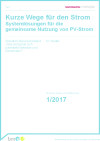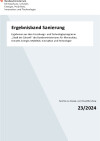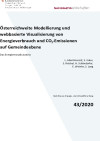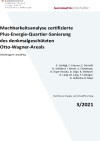Suchergebnisse
Förderentscheidung der 4. Ausschreibung „Stadt der Zukunft“
Die Förderentscheidung der 4. Ausschreibung des Forschungs- und Technologieprogramms "Stadt der Zukunft" wurde Anfang Juli 2017 bekannt gegeben. Grundlage für diesen Entscheid ist das Ergebnis einer internationalen ExpertInnen-Jury, die für 22 Projekte eine Förderempfehlung abgegeben hat.
LehB:klimafit! Live in existing buildings today: climate fit together
The aim of the project is to explore transferable renovation concepts for the implementation of climate-fit renovations in Vienna. Integrally optimized renovation packages will be developed, which will be optimized in the building ensembles for implementation-probable, climate-friendly overall solutions with the relevant stakeholders.
Kurze Wege für den Strom: Systemlösungen für die gemeinsame Nutzung von PV-Strom

Aktueller Diskussionsstand: „Was wünschen sich potentielle Betreiber und Gemeinden?“ Zusammenfassende Betrachtung auf der Basis eines Stakeholder-Workshops am 20. Jänner 2017 in St. Pölten.
Schriftenreihe
1/2017
M. Wedler, B.A.U.M. Consult
Herausgeber: BMVIT
Deutsch, 26 Seiten
Downloads zur Publikation
Eröffnung von gugler*s Sinnreich
08. September 2017
Auf der Schön 2, Melk, AT
Das Kommunikationshaus gugler* in Melk feierte die Einweihung von Österreichs erstem recycelbaren Cradle to Cradle™-inspirierten Plusenergie-Gebäude, das als Teil eines "Haus der Zukunft"-Leitprojekts umgesetzt worden ist.
Pressekonferenz zur Forschungs- und Entwicklungsinitiative "Innovationslabor act4.energy"
Am 23. April 2018 wurde das "Innovationslabor act4.energy" vorgestellt. Das Vorhaben soll einen wesentlichen Beitrag zur Forschung und Entwicklung beim Thema "digitale Erneuerbare Energie-Systeme" leisten und Lösungen entwickeln um Photovoltaik-Strom und andere stark fluktuierende Erneuerbare Energieträger verstärkt lokal nutzbar zu machen.
Smart Cities Demo - Living Urban Innovation 2018
In einer Smart City oder einer Smart Urban Region werden technische und soziale Innovationen intelligent eingesetzt und kombiniert, um die Lebensqualität künftiger Generationen zu erhalten bzw. zu optimieren. Die Ausschreibung ist bis 22. Oktober 2018 geöffnet und mit einem Budget von 4,9 Mio. Euro dotiert.
IEA HPT Annex 55: Comfort Climate Box - Online-Workshop im Rahmen der e-nova
26. November 2020
Online
Kompakte Wärmepumpenlösungen mit integrierten Speichern und intelligenter Regelung zum Heizen, Kühlen und zur Warmwasserbereitung für die Sanierung von Ein- und Mehrfamilienhäusern.
Mit Energieforschung und innovativen Energie- und Speichertechnologien zur Energiewende
17. Juni 2021
Online
BMK Energieforschungserhebung & Marktstatistik 2020 Energieforschung und innovative Energieerzeugungs-, Umwandlungs- und Speichertechnologien spielen eine Schlüsselrolle in der Energiewende zur Erreichung der Klimaneutralität bis 2040. Zielgerichtete Innovationsprozesse im Bereich nachhaltiger Energiesysteme sind dafür dringend erforderlich.
Forschungsinitiative "Zukunftssicheres Bauen" – Phase 3 (2019–2021)
Die vom Fachverband der Stein- und keramische Industrie initiierte Forschungsinitiative „Zukunftssicheres Bauen“ liefert – angelegt als Forschungskooperation von Industrie und Forschungseinrichtungen – wissenschaftliche Erkenntnisse für die Weiterentwicklung nachhaltiger Bauweisen. Die Ergebnisse aus den Projekten der Forschungskooperation werden regelmäßig mit der Fachöffentlichkeit geteilt. Die ÖGUT ist mit der wissenschaftlichen Begleitung der Initiative betraut und transferiert die Ergebnisse in das österreichische Energie- und Gebäudeforschungsprogramm „Stadt der Zukunft“ und auf die Plattform "Nachhaltig Wirtschaften".
DALEC - Day- and Artificial Light with Energy Calculation
In the course of DALEC an online concept evaluation tool for architects, building engineers, lighting designers and building owners was developed. Although easy to use, the software accounts for the complex thermal and light processes in buildings and allows a simple evaluation of heating, cooling and electric lighting loads. Not only energy, but also user behavior were considered (e.g. in terms of glare protection) and visual and thermal comfort were evaluated. This novel and innovative, holistic approach makes sustainable and energy efficient building design possible for new buildings as well as refurbishment.
BMK Highlights der Bauforschung & Ausrichtung der nationalen Bauforschung ab 2024
16. Oktober 2023, 13:00 - 17:30 Uhr
Technische Universität Graz, Kronesgasse 5, 1. Obergeschoß, 8010 Graz
Die Veranstaltung war ein Partner-Event der Impact Days des RENOWAVE Kongresses und präsentierte aktuelle Ergebnisse der angewandten Bauforschung mit Fokus auf nachhaltige Lösungen für klimaneutrale Gebäude und Quartiere.
Innovationskongress: Digitales Planen, Bauen & Betreiben
30. November 2023, ab 9:30 Uhr
aspern Seestadt, ARIANA, Christine-Touaillon-Straße 4, 1220 Wien
Der Innovationskongress richtet den Blick auf die Zukunft der Bau- und Immobilienbranche.
Ergebnisband "Sanierung"

Der vorliegende Ergebnisband stellt abgeschlossene Projekte aus dem Forschungs- und Technologieprogramm „Stadt der Zukunft“ des Bundesministeriums für Klimaschutz, Umwelt, Energie, Mobilität, Innovation und Technologie (BMK) im Bereich innovativer Gebäudetechnologien vor. Die gewonnenen Erkenntnisse sollen eine Entwicklung in Richtung energieeffiziente und klimaverträgliche Stadt unterstützen, die auch dazu beiträgt, die Lebensqualität und die wirtschaftliche Standortattraktivität zu erhöhen.
Schriftenreihe
23/2024
Bianca Pfefferer
Herausgeber: BMK
Deutsch, 28 Seiten
Downloads zur Publikation
Blickpunkt Forschung: Leben in der vernetzten Stadt
14. Oktober 2020, 14:00 Uhr
TUtheSky und online
Ergebnisse aus Forschungsprojekten der TU Wien, die sich mit den Bedürfnissen der BewohnerInnen befassen und positive Effekte auf Gesundheit und Umwelt haben, werden präsentiert.
Energiemosaik Austria - Österreichweite Modellierung und webbasierte Visualisierung von Energieverbrauch und CO2-Emissionen auf Gemeindeebene

Inhalt des Projektes ist eine alle Nutzungs- und Mobilitätsarten umfassende Modellierung und webbasierte Visualisierung von Energieverbrauch und Treibhausgasemissionen aller österreichischen Gemeinden. Die Ergebnisse können in zahlreiche energie- und klimarelevante Handlungsfelder integriert und für die Sensibilisierung von Entscheidungsträgern und Öffentlichkeit genutzt werden.
Schriftenreihe
43/2020
L. Abart-Heriszt, S. Erker, S. Reichel, H. Schöndorfer, E. Weinke, S. Lang
Herausgeber: BMK
Deutsch, 56 Seiten
Downloads zur Publikation
Ausschreibung: ERA-NET Cofund Urban Transformation Capacities
Der Call „ERA-NET Cofund Urban Transformation Capacities“ (ENUTC) richtet sich an Forschungs- und Innovationsvorhaben, die den Kapazitätsaufbau für urbane Transformationsprozesse in Richtung nachhaltiger, resilienter und lebenswerter Städte ermöglichen.
Machbarkeitsanalyse zertifizierte Plus-Energie-Quartier-Sanierung des denkmalgeschützten Otto-Wagner-Areals (OttoWagner-ArealPlus)

Entwicklung eines innovativen denkmalschutzverträglichen Sanierungskonzepts zur Transformation des Wiener Otto Wagner-Areals in ein Plus-Energie-Quartier. Das Jugendstil-Juwel umfasst eine Fläche von rund 50 Hektar, 70 Gebäude und eine Brutto-Grundfläche von rund 200.000 m². Der Lösungsansatz umfasst dabei höchste Energieeffizienz- und Komfortanforderungen.
Schriftenreihe
3/2021
K. Schlögl, C. Kresser, E. Schriefl, H. Schöberl, I. Artner, S. Chatterjee, D. Ürge-Vorsatz, D. Ürge, K. Stieldorf, F. Gharakhanzadeh, I. Stieldorf, G. Lang, M. Lang, T. Lebinger, G. Jedliczka, B. Mayr
Herausgeber: BMK
Deutsch, 162 Seiten
Downloads zur Publikation
Neuigkeiten im Bereich „Innovative Stadtbegrünungstechnologien“
Gebäude- und Stadtbegrünung unterstützt die Klimawandelanpassung in Städten wesentlich. Das Forschungsprogramm „Stadt der Zukunft“ widmet daher sich seit Jahren in einem eigenen Programmschwerpunkt der Erforschung neuer Konzepte, Technologien und Planungsinstrumente zur Realisierung einer nachhaltigen, klimasensiblen Stadtentwicklung. Erfahren Sie mehr über aktuelle Highlights, neue Forschungserkenntnisse und Aktivitäten aus den Projekten und Initiativen, Veranstaltungen und druckfrische Publikationen im Themenfeld.
GRÜNSTATTGRAU Praxistag: Bauwerksbegrünung
15. Juni 2021
Austrian Standards
Die Veranstaltung beleuchtet neueste Erkenntnisse, Technologien und Projekte, umgesetzt mit Gemeinden/Städten oder mit Wohnbauträgern.
Ausschreibung: Leuchttürme für resiliente Städte 2040
Das Programm "Leuchttürme für resiliente Städte 2040" im Rahmen der Smart Cities Initiative des Klima- und Energiefonds fördert Beiträge rund um die Transformation von Städten in Richtung Klimaneutralität und Resilienz. Die sechs Aktionsfelder Energieversorgung & -nutzung, Bestand & Neubau, Warenströme & Dienstleistungen, Stadtökologie & Klimawandelanpassung, Siedlungsstruktur & Mobilität sowie Kommunikation & Vernetzung bilden den grundlegenden Themenrahmen. Einreichschluss: 19. Oktober 2021
